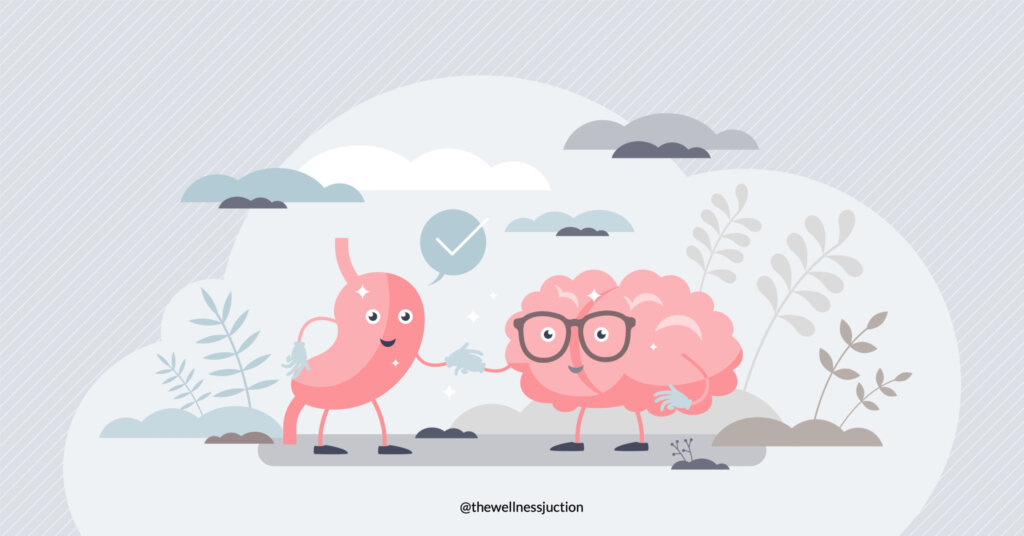Written by Andrew Akhaphong, MS, RD, LD, Mackenthun’s Registered Dietitian
Updated: April 25, 2024
According to the United States Department of Agriculture, more than 1 in 5 US adults live with a mental illness.(1) “This is equivalent to over 50 million Americans”.(2) Additionally 1 in 10 US youths have depression which creates a barrier to succeeding in school, family, social relationships and sports.(2)
Receiving care for mental health can be difficult in the United States. It is estimated for every one mental health provider there are 350 patients on their case.(2) In 2023 about 42% of US adults and 59.8% of US youths with a mental illness were not able to afford the costs to receive treatment.(2)
A barrier to receiving mental health care include stigma, prejudice, and discrimination towards persons living with a mental illness.
The American Psychiatric Association shared definitions provided by Corrigan et al.-

As we continue to advocate access and increase awareness for mental health and mental healthcare there has been an emergence of research on how food may affect our mental health.
Genetics and Depression
Neuroscience and psychiatry is one of the most heavily researched and difficult fields to understand. The National Health Society of the United Kingdom reports it can take at least two weeks to a month to clinically diagnose an individual with major depressive disorder!
Studies report genetics have a 30-40% influence on the likelihood of a person developing a mental health illness.(5) It is theorized that genetic abnormalities to the genes SLC6A4, TPH2, tryptophan hydroxylase, and COMT is what may increase risk of depression. These genes are what influences the production of serotonin and dopamine (happy hormones).(6)
The remaining 60-70% is influenced by childhood and environmental experiences including abuse, low social support, and witnessed traumatic events.(5)
Stress, Inflammation, and Depresison
Hormonal regulation is difficult to understand; there are so many chain reactions involved in how certain body responses are the way they are! The hypothalamus (a region of the brain) produces a hormone called CRH in response to mental stress (work overload, conflicts, anxiety, etc.). The CRH hormone targets the adrenal glands (sits above our kidneys) to produce the stress hormone called cortisol.(7) Long-term history of high stress increases the risk for depression.(8)
Though studies are limited, some report untreated inflammation may increase risk for developing a mental health illness, or worsen symptoms of existing mental health illness. Cortisol, as identified prior, may also lead to increased levels of C-reactive protein, a biomarker of inflammation in the body.(9) Higher levels of inflammation may impair sleep, increase weight gain, cause abnormalities in metabolic processes such as blood sugar regulation, and cause high cholesterol.Persons who scored 0-7 on The Hamilton Depression Rating Scale are considered to have well-controlled depressive symptoms and are reported to have C-reactive proteins within normal ranges.(10)
Nutrition and Mental Health

Nutrition and mental health is an emerging area of practice and even now, there are limited studies that help us understand how it may reduce risk for mental health illnesses or improve symptoms. Current information suggests integrative nutritional approaches for mental health support are based on alleviating stress and/or inflammatory biomarkers.
Omega-3 fatty acids are an essential nutrient that must be consumed from the diet. There are three types: alpha-linolenic acid (ALA, from plants), eicosapentaenoic acid (EPA, from seafood), and docosahexaenoic acid (DHA, from seafood). The World Health Organization recommends 250 milligrams of EPA+DHA a day which is equivalent to eating 8-ounces of seafood per week. Most American diets are higher in ALA, but only 5% of it is converted into EPA and 1% into DHA by the liver.(12) According to studies by the International Society for Nutritional Psychiatry, persons with high C-reactive protein levels have been found to have low levels of omega-3 fatty acids as EPA+DHA while ALA is high. The organization reports supplementing at minimum 500-milligrams of omega-3 fatty acids from fish oil or krill oil with an anti-depressant improves depressive symptoms more than doing an anti-depressant or omega-3 fatty acid supplement alone. (10,13)
Zinc is an essential trace mineral that supports brain and neurological function. We are required to eat it from food as our body cannot make it; sources include red meat, whole grains, beans, nuts, seeds, and seafood. Since the 1980’s low levels of zinc have been correlated with depression.(13) Stress has been shown to increase inflammatory white-blood cells and lower albumin. Albumin is a type of protein that helps us absorb zinc. A 30-milligram dose of zinc per day is recommended for persons low in zinc or those who eat a vegetarian or vegan diet. Zinc is more absorbable from animal sources due to it being albumin-bound whereas albumin is absent in plant sources.(13)
Magnesium is an essential nutrient that comes from green leafy vegetables, nuts, seeds, beans, and whole grains. A study in 2005 reported that 68% of Americans do not meet the recommendations of daily magnesium consumption.(14) Magnesium is important in the regulation of behaviors and emotional responses for the limbic system of our brain.(15) The Patient Health QUestionnaire-9 (PHQ-9) is an assessment that measures severity or risk of depression. A score of 10 or higher is considered a presence of depressive symptoms. A study in 2017 followed 126 adults and were given 248-milligrams of magnesium per day for 6-weeks. At the end of the study the participants exhibited a 6-point decrease in their PHQ-9 score from their baseline.(16) An additional study in 2017 examined 60 people and were given 500-milligrams of magnesium per day for 8-weeks and exhibited similar results.(17) Do note both of these sample sizes were small and the duration of the study was short.
Selenium can be challenging essential nutrients to consume enough of. Soil health influences selenium levels. Crops grown in that soil will vary in selenium content. Animals eating those crops will also vary in selenium content. Selenium comes from pork, whole grains, seeds, nuts, beans, and offal meats like liver. Selenium helps with the metabolism of a protein called tryptophan (high in pork, turkey, and chicken); tryptophan is needed to produce serotonin (happy hormone) and melatonin (sleep). Selenium also has anti-inflammatory effects on the brain and nervous system.(18) A study in 2015 examined 978 young adults for 13-days. Their blood selenium levels, mood, and food were measured throughout the study. Persons who showed a blood selenium level of less than 82-micrograms per deciliter scored higher on the PHQ-9 and exhibited greater depressive symptoms.(19) At most 45-micrograms per day of supplementation was recommended.
The Gut-Brain Connection
Emerging, but limited studies have reported 90% of your serotonin (happy hormone) is made in the gut and the remaining 10% by your pituitary gland in the brain.(20)
Stress, inflammation, and depressive-like symptoms have been shown in animal studies to create an imbalance in the gut microbiome and their functions in metabolism; when there is an imbalance the gut bacteria focuses on increasing inflammatory and stress responses by releasing cytokines.(20,21) By consuming more pre-biotics, food for bacteria, will allow the gut bacteria to ferment these into short-chain fatty acids, reducing cytokine production.(20)
Sources of pre-biotics include whole grains, beans, nuts, seeds, garlic, artichoke, onions, and asparagus.

Additional Sources
For further assistance in mental health support, please contact your primary care clinic or access the following –
Suicide and Crisis Lifeline – dial or text 988, or, text “HOME” to 741741
Substance Abuse and Mental Health Treatment – 1-800-662-4357
The Trevor Project – 1-866-488-7386
Minnesota Farm and Rural Helpline – 1-833-600-2670
References:
- Centers for Disease Control and Prevention. About mental health. Updated April 16, 2024. Accessed April 25, 2024. https://www.cdc.gov/mentalhealth/learn/index.htm
- Mental Health America. The state of mental health in America. n.d. Accessed April 25, 2024. https://mhanational.org/issues/state-mental-health-america
- Singhal N. Stigma, prejudice and discrimination against people with mental illness. The American Psychiatric Association. Updated March 2024. Accessed April 25, 2024. https://www.psychiatry.org/patients-families/stigma-and-discrimination
- National Health Society. Diagnosis – depression in adults. Updated July 5, 2023. Accessed April 25, 2024. https://www.nhs.uk/mental-health/conditions/depression-in-adults/diagnosis/
- Sullivan PF, Neale MC, Kendler KS. Genetic epidemiology of major depression: review and meta-analysis. Am J Psych. 2000; 157(10):1552-1562. doi.org/10.1176/appi.ajp.157.10.1552
- Alshaya DS. Genetic and epigenetic factors associated with depression: an updated review. Saudi J Biol Sci. 2022; 29(8):103311. doi: 10.1016/j.sjbs.2022.103311
- Hasler G. Pathophysiology of depression: do we have any solid evidence of interest to clinicians?. World Psychiatry. 2010; 9(3):155-161. doi: 10.1002/j.2051-5545.2010.tb00298.x
- Amasi-Hartnoonian N, Sforzini L, Cattaneo A, Pariante CM. Cause or consequence? Understanding the role of cortisol in the increased inflammation observed in depression. Curr Op End Met Res. 2022;24. doi.org/10.1016/j.coemr.2022.100356
- Schrock JM, McDade TW, Carrico AW, D’Aquila RT, Mustanski B. Traumatic events and mental health: The amplifying effects of pre-trauma systemic inflammation. Brain Behavior and Immunity. 2021;98:173-184. doi.org/10.1016/j.bbi.2021.08.208
- Orsolini L, Pompili S, Valenta ST, Salvi V, Volpe U. C-reactive protein as a biomarker for major depressive disorder?. Int J Mol Sci. 2022; 23(3):1616. doi: 10.3390/ijms23031616
- Anderson BM, Ma DWL. Are all n-3 polyunsaturated fatty acids created equal?. Lipids Health Dis. 2009;8(33). doi: 10.1186/1476-511X-8-33
- Tiemeier H, van Tuijl HR, Hofman A, Kiliaaan AJ, Breteler MMB. Plasma fatty acid composition and depression are associated in the eldery: the Rotterdam study. 2003; 78(1):40-46. doi.org/10.1093/ajcn/78.1.40
- Wang J, Um P, Dickerman BA, Liu J. Zinc, magnesium, selenium, and depression: A review of the evidence, potential mechanisms and implications. Nutrients. 2018;10(5):584. doi: 10.3390/nu10050584
- King DE, Mainous III AG, Geesey ME, Woolson RF. Dietary magnesium and C-reactive protein levels. J Am College Nutr. 2005;24(3):166-171. doi.org/10.1080/07315724.2005.10719461
- Eby GA, Eby KL. Rapid recovery from major depression using magnesium treatment. Medical Hypotheses. 2006;67(2):362-370. doi.org/10.1016/j.mehy.2006.01.047
- Tarleton EK, Littenberg B, MacLean CD, Kennedy AG, Daley C. Role of magnesium supplementation in the treatment of depression: A randomized clinical trial. PLOS One. 2017;12(6):e0180067. doi.org/10.1371/journal.pone.0180067
- Rajizadeh A, Mozzaffari-Khosravi H, Yassini-Ardakani M, Dehghani A. Effect of magnesium supplementation on depression status in depressed patients with magnesium deficiency: A randomized, double-blind, placebo-controlled trial. Nutrition. 2017;35:56-60. doiI: 10.1016/j.nut.2016.10.014
- Haung D, Lai S, Zhong S, Jia Y. Association between serum copper, zinc, and selenium concentrations and depressive symptoms in the US adult population, NHANES (2011-2016). BMC Psychiatry. 2023;498. doi: 10.1186/s12888-023-04953-z
- Tamlin CS, Aimee RC, Jody MC. Optimal serum selenium concentrations are associated with lower depressive symptoms and negative mood among young adults. J Nutr. 2015;145(1):59-65. doi.org/10.3945/jn.114.198010
- Appleton J. The gut-brain axis: Influence of microbiota on mood and mental health. Integr Med (Encinitas). 2018;17(4):28-32. PMID: 31043907
- van den Elsen LW, Poyntz HC, Weyrich LS, Young W, Forbes-Blom EE. Embracing the gut microbiota: the new frontier for inflammatory and infectious diseases. Clin Transl Immunol. 2017;6(1):e25. doi.org/10.1038/cti.2016.91





